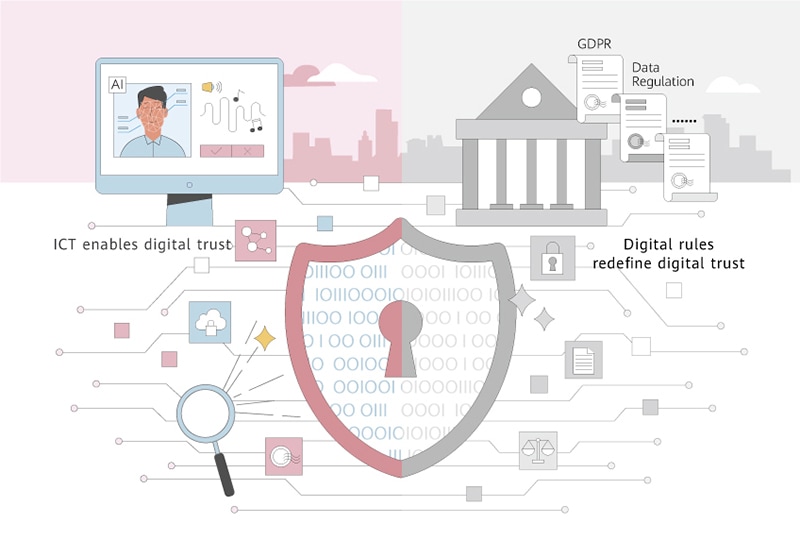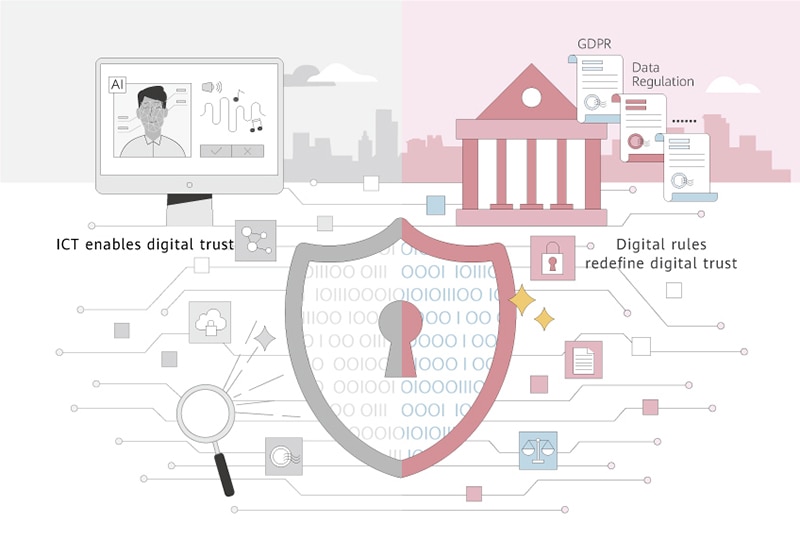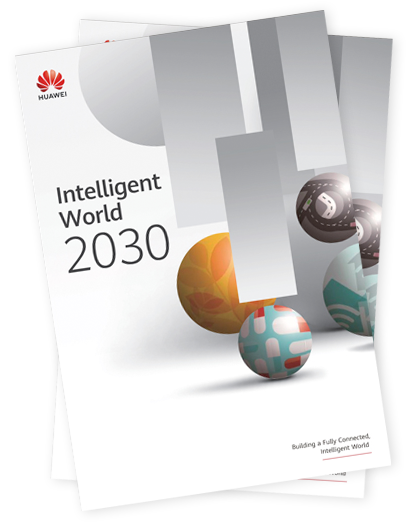Technologies and Regulations Shape a Trusted Digital Future
In 2030, digital trust will be a basic requirement for our social infrastructure. We will need a combination of technical and organizational measures: blockchain, AI fraud detection, and privacy-enhancing computation. This will need to be combined with privacy and security regulations such as the General Data Protection Regulation (GDPR). Used together, these measures will deliver an intelligent world with digital trust.
Predictions
Directions for Exploration

ICT enables digital trust
Snapshot from the future: Smart contracts on the blockchain
Blockchain-based smart contracts contain terms expressed in a digital form on a blockchain, and the recording and processing of these terms are completed on the blockchain. The code of the contract contains the obligations of the parties and all information relating to the transactions. The obligations are performed automatically when the set conditions are met, and no third parties are required. Blockchain technology allows information to be recorded and distributed, which ensures that the entire process, from contract storage and access to performance, is transparent, traceable, and non-tamperable.
According to a consulting company, consumers in the US and EU could save US$30 to US$110 per year on their motor insurance premiums, and insurers would reduce the cost of settling claims by US$21 billion a year globally.
Snapshot from the future: Using AI to identify fraud and maintain organizational reputation and credibility
Neural networks for deep learning can be used to analyze natural language and images, and even to understand video and audio. This can allow us to distinguish between authentic and deepfake videos. AI can be used to detect differences between videos, or even slight differences in audio waves. It can thus identify whether a video or audio was composed using AI. Machine learning and API technology can be used to automate defense. In particular, discriminator algorithms and causal inference models can be used to automatically detect, assess, and remove fake information on the Internet, and trace it back to the data source to provide evidence for the prosecution of digital crimes.
Snapshot from the future: Privacy-enhancing computation
Privacy-enhancing computation (PEC) technologies are data security technologies used to protect and enhance privacy and security during the collection, storage, search, and analysis of private information. PEC supports efficient, high-quality services by protecting personal data from abuse, while allowing effective use of the data, and realizing its business, scientific, and social value.

Rules redefine digital trust
Snapshot from the future: New mechanisms for collecting personal information online
More and more laws and regulations concerning the over-collection of data have been passed in recent years. In the context of big data, a fair digital strategy would contain optimized mechanisms that balance the privacy of individuals and the interests of data users creating value with consumer data. The level of control data subjects have over their own personal information will be further enhanced while preserving the conventional approach of obtaining informed consent. In 2021, China promulgated its first Personal Information Protection Law.
Snapshot from the future: Data protection rules in international markets
In addition to the General Data Protection Regulation (GDPR), other countries have also passed laws and regulations on data protection. In 2020, the US published its Federal Data Strategy 2020 Action Plan, which includes the goals of protecting data integrity, conveying data authenticity, and ensuring data storage security. The UAE passed a Data Protection Law for specific sectors, and the Privacy Act 2020 is in effect in New Zealand.
Snapshot from the future: The global rise of antitrust action in the data domain
In 2019, the US Department of Justice launched sweeping investigations into the biggest tech giants, suggesting that they had monopolized the market, suppressed competition, and violated user privacy. On May 27, 2020, Japan passed the Act on Improving Transparency and Fairness of Digital Platforms, which was designed to regulate specific digital platforms and enforce obligations to the public on those platforms. On January 19, 2021, the 10th amendment to the German Act Against Restraints of Competition entered into force. In 2021, the Anti-Monopoly Committee of the State Council of China published the Guidelines for Anti-monopoly in the Platform Economy.
More Outlooks













